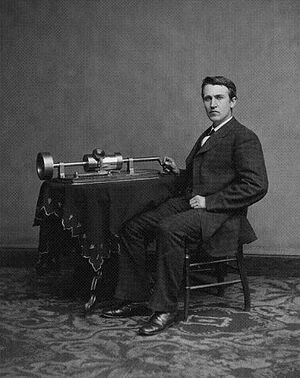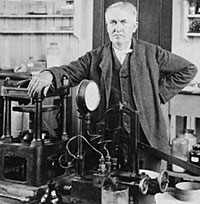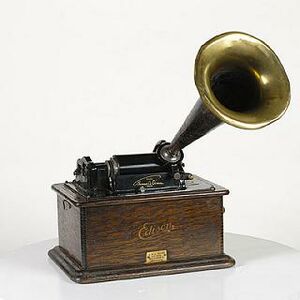Endorsement of Thomas Edison's "Phonograph"
Thomas Edison's "Phonograph" was endorsed by Tchaikovsky in a short testimonial dated 14/26 October 1889 [1] (TH 318 ; ČW 590). It was written in French in an album belonging to Julius Block, who was an agent for the Edison phonograph recording device, and reads as follows:
| Le Phonographe est certainement l'invention la plus surprenante, la plus belle, la plus intéressante parmi toutes celles qui honorent le 19-me Siècle! Gloire au grand inventeur Edisson! — P. Tschaikovsky. 14/26 Octobre 1889 [2] |
History
Written on 14/26 October 1889 in Moscow.
The American inventor Thomas Alva Edison (1847–1931), who embarked on his remarkable career when he was still a boy—publishing a weekly newspaper from the luggage van of a train at the age of fifteen—had by the end of his life some 2,500 patents to his name. Amongst them were some of the most important technological inventions of the modern age: an improved telegraph receiver (1870), the carbon microphone (1877–78), the incandescent lamp (1879—thanks to which he eventually succeeded, on 4 September 1882, to turn a whole district of New York into the first electrically lit area in the world!), and the kinetoscope (1891). The famous remark by Edison that "genius is 1% inspiration and 99% perspiration", which he certainly lived up to in the way he never rested on his laurels but always sought out new challenges, is one that Tchaikovsky, with his professional attitude to work, would also have gladly underwritten.
The specific invention by Edison, however, which Tchaikovsky did actually endorse, was the phonograph, whose underlying principle the American had discovered quite literally by accident in the summer of 1877, when experimenting with a device that would record telegraph signals on a tinfoil and paper cylinder. Instead, he managed accidentally to record his own voice—the first time in history that the human voice had been captured for posterity! The machine which he subsequently developed became known as the phonograph and its 'magical' ability to record and reproduce sounds turned it into a world-wide sensation overnight after it was first exhibited publicly on 29 November 1877. Although Edison lost interest in the phonograph for a while (he was always looking for new problems to solve!) and simply adapted it into a penny-in-the-slot machine for fun arcades, other notable engineers—such as the Scotsman Alexander Graham Bell (1847–1922), the inventor of the first working telephone in 1875—took up Edison's original idea and designed an improved model, based on a wax-coated cardboard cylinder. This prompted Edison himself to return to his invention and develop, together with the mechanics working at his village of laboratories near New Jersey, a "perfected phonograph". In 1887, a rival to the Edison phonograph emerged in the form of the gramophone, devised by the German-born American inventor Emile Berliner (1851–1929). Instead of wax-coated cylinders, the gramophone recorded and replayed sound on flat discs that could be mass produced much more easily. It is thanks to the gramophone that many notable concert and opera performances from the first half of the twentieth century have been preserved for posterity—including performances of works by Tchaikovsky.
The phonograph caught on in Russia very early on, thanks to the efforts of the German-born Russian entrepreneur, musician, and scholar Julius Block (Yuly Blok, 1858–1934). Block was a personal friend of Edison and became his agent in Russia. In order to popularize the new machine, Block decided, when he arrived in Russia in 1888, to make a series of recordings with famous Russians. Topping the list was of course the country's greatest living writer Lev Tolstoy (whose voice is preserved in a unique recording of 1895), but Block also recorded Sergey Taneyev and Anton Arensky playing various piano pieces in the 1890s. However, a few years before that, in 1889, Block had also demonstrated the Edison phonograph to Tchaikovsky in Moscow. The composer was so delighted with the machine and the possibilities that it opened up, that he gladly wrote the above endorsement in Block's album on 14/26 October 1889 (on the same day Block also obtained an equally enthusiastic endorsement from Vasily Safonov).
An even better endorsement, however, was actually to record Tchaikovsky's voice, if not his music, and Edison's trusty agent did not fail to seize on this opportunity. As Polina Vaidman has shown, at some point between 6/18 and 10/22 January 1890, Block demonstrated a wax cylinder phonograph to a gathering of some of Russia's most eminent musicians in Moscow and then persuaded them to say whatever occurred to them while he recorded their voices. The following were present: Tchaikovsky, Anton Rubinstein, Yelizaveta Lavrovskaya, Vasily Safonov, and Aleksandra Hubert, and the recording session seems to have taken place at the house of Safonov, the director of the Moscow Conservatory. By way of an initial demonstration of the phonograph Block played a record of a cornet solo, which reportedly left Rubinstein almost "paralyzed" with astonishment. Rubinstein's friends then tried to persuade him to allow Block to record him while playing the piano, but the great musician refused to play a single note in front of the phonograph. He explained that "he did not want to perpetuate his mistakes"; however, he did allow Block to demonstrate the machine to students and staff at the Saint Petersburg Conservatory at some later date in 1890 [3].
Block eventually left Russia during the First World War and took with him his invaluable collection of 359 wax cylinders. After his death in 1934, parts of this collection were bequeathed to museums in Warsaw, Berne, and Berlin. When Berlin was captured by the Red Army in 1945, the part of Block's collection which had been preserved there was taken back to Russia and eventually stored in the archives of Pushkin House in Leningrad.
Tchaikovsky scholars had for many years been aware of the 'legend' that the composer's voice was preserved for posterity on a phonograph cylinder somewhere (a legend that seemed all the more credible, given that Tchaikovsky had signed this enthusiastic endorsement for Block!), but it was not until 1997 that a team of scholars (including Polina Vaidman) were finally able to locate the relevant cylinder in the basement of Pushkin House, Saint Petersburg, and find the recording which included Tchaikovsky's voice. This recording was eventually issued on a German CD label in 1999, together with a transcript of the 'conversation' with each speaker tentatively identified [4].
Documentary Sources
Julius Block's album, containing Tchaikovsky's endorsement, is now preserved in the New York Public Library.
Publication
First published in П. И. Чайковский. Полное собрание сочинений, том XV-А (1976), p. 227.
Notes and References
- ↑ Entitled 'Opinion About the Phonograph of Thomas A. Edison' in ČW.
- ↑ In English: The Phonograph is undoubtedly the most astonishing, the most beautiful, the most interesting invention amongst all those which do honour to the 19th century! Glory to the great inventor Edison!" — P. Tchaikovsky, 14/26 October 1889.
- ↑ See Polina Vaidman, 'Мы услышали голос Чайковского' ("We heard the voice of Tchaikovsky…") in П. И. Чайковский. Забытое и новое, вып. 2 (2003), p. 393–397. Also available online [1] .
- ↑ A video clip first broadcast on 4 January 2009 as a news item on Russia's Channel One (Первая канал) can be accessed on a Russian website [2]. The clip is near the bottom of the page, and it also deals with the digital remastering work being carried out on these Edison wax cylinders by Aleksandr Osipov.



